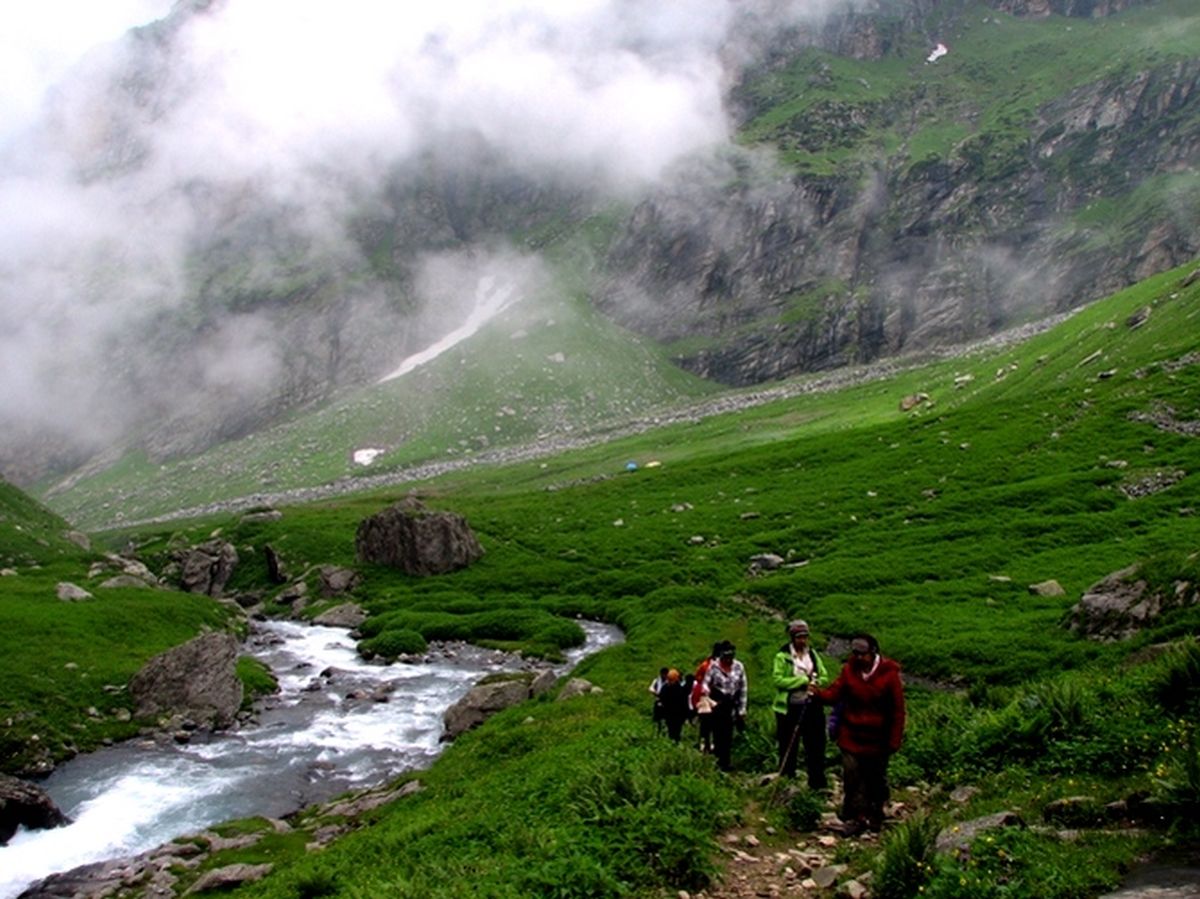 | « Back to article | Print this article |
An expert team in search of the lost trek routes to Chardham has returned with hopes for the revival of at least three old trails to the Himalayan temples.

If revived, the three treks discovered during the exploration can bring the pilgrimage spirit back to the yatra besides boosting tourism in Uttarakhand in a big way, team leader Rakesh Pant told PTI after the end of the arduous expedition.
The 25-member team led by Pant returned to Rishikesh on Monday after traversing a distance of 1,158 km on foot braving the vagaries of the weather in highly difficult terrain in 50 days.
"The journey, though arduous and challenging, was highly rewarding and rich in experience. We had a rare opportunity to speak to nonagenarians who are living witnesses to the good old times when the lost routes were alive and in use by pilgrims," Pant said.
The team even stayed in "chattis" or transit camps en route to the temples which were so popular with the pilgrims when the yatra used to be conducted on foot in the absence of motorable roads.
The three lost treks which can be revived are Rishikesh-Devprayag hiking trail, Gangotri to Kedarnath trek via Bhatwari-Belak pass-Budha Kedar-Panwali Kantha and Trijugi Narayan and Dharasu to Yamunotri via Falacha Top, Pant said.
There is scope for the revival of these trails with some effort by the government, he said.
Many routes are now totally lost due to the construction of the Tehri dam, Pant, who runs the NGO named Trek The Himalayas which conducted the expedition jointly with the Uttarakhand Tourism Development Board, said.
He said his NGO along with UTDB, is working on a documentary and a book summing up their experience during the exploration in two months.
The exploration was part of the state government's efforts to revive the old trek routes to chardham which fell into abeyance after motorable roads and national highways leading to the temples came into being and full-fledged transport services became available to pilgrims.
The team included trek researchers, SDRF officials, Media team and support team.
The Chardham circuit consists of four ancient pilgrimage sites in the state of Uttarakhand including Yamunotri, Gangotri, Kedarnath, and Badrinath.
In the past, the yatra was primarily done by wandering ascetics and spiritual seekers who would take up the challenge of walking these long and arduous trails, sometimes ascending to elevations of 4,000 metres.
"Wading through flowing rivers, crossing the high mountain passes, climbing over the steep ascents, team traversed the hardest terrains, explored the remotest villages, talked to people who are so old that they witnessed the yatra happening decades ago, and were even part of the organising and logistics part of it," Pant said.
In those times, the Baba Kali Kamli group made efforts to organise the pilgrimage by establishing food points and accommodation points called chattis at different stages of the yatra.
During the recce, the team re-explored different 'Chattis' used in the olden times as a structured system of providing free ration and dharamshala to make this quest more comfortable for the travellers.
The Baba Kali Kamli group established around 80 chattis at the time, out of which only a few are in an accommodating condition with most of them lying in ruins now.
They camped in various chattis and ashrams during the yatra, doing their best to come as close to the ancient Yatra traditions as possible.
The team trekked through some high mountain passes including Panwali Kantha which is at a height of 11,500 ft in the Garhwal Himalayas. The meadows of Panwali Kantha are known for their breathtaking views of prominent peaks like Thalay Sagar, Meru, Kirti Stambh, Kedar Dome, Kedarnath, Chaukhambha, Nilkanth, etc.
The team discovered a plethora of such places where weekend treks, day hikes, long treks, biking trails , trek and drive programs, can be developed, he said.
The data collected by the team during the recce on the flora and fauna, water streams, altitude, terrains, local food, culture, beliefs and all the points that need repairing, will be submitted to the UTDB in a structured form, Pant said.